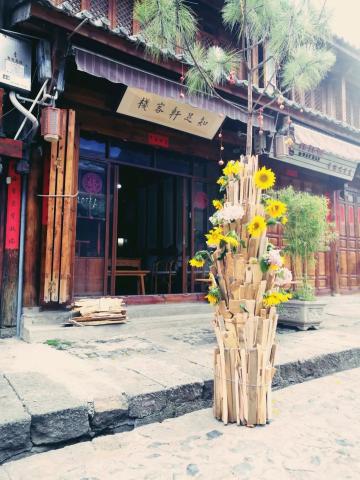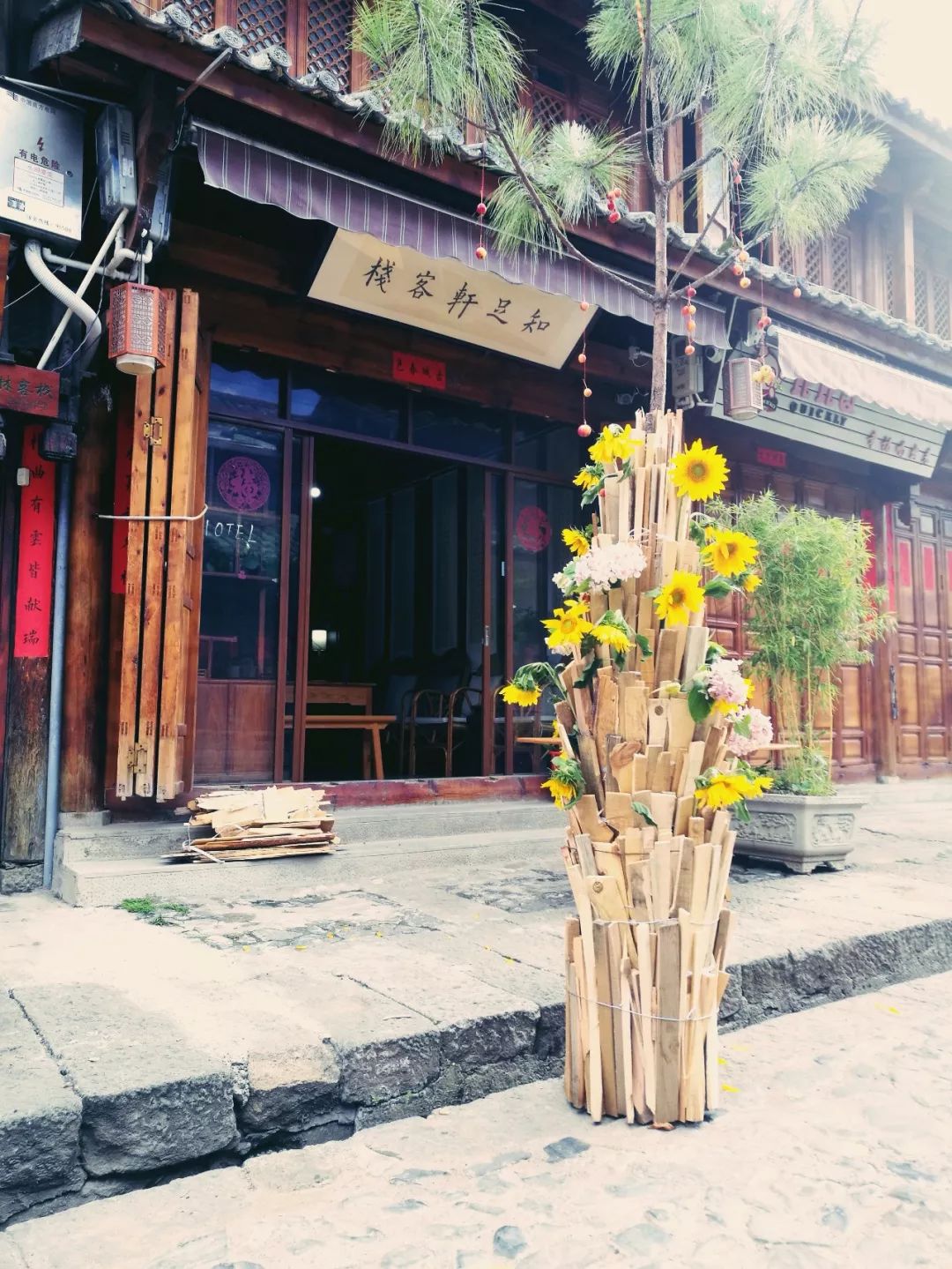
I didn’t do any homework before going on this trip, but I was lucky enough to meet Bai compatriots celebrating the Torch Festival.
The Torch Festival is a traditional festival of the Bai people. On the day of the festival, men, women, old and young gather together to worship, light, play and jump on torches to wish for a bumper harvest and a prosperous livestock.
Actually, I didn't play with fire. I was really timid and didn't dare to get burned. I just hid and watched others play, but the exciting and exciting feeling spread throughout my body and made my blood boil!

At the inn where we stayed in Jianchuan, the owner treated us like guests. He prepared drinks, fruits, corn and other food and placed them at the door facing the street. We ate tea and drank while watching the fire play. It felt like celebrating the New Year when we were children.














The next day, I was walking around Jianchuan County and passed by an oil pressing mill.

Jianchuan is a place where literati are born, and all the locals have couplets and traditional Chinese paintings on their doors.



Looking at the delicacies described by the poet, I couldn't help but take out my money and buy some old ham!

Jianhu in Jianchuan

Special thanks to our "World Traveling Group" friends, Brother Qianli Dangkou (screen name) from Jianchuan for the warm hospitality to us! At the luncheon at the villa by Jianhu Lake, I had "roasted fish with sour papaya" and many other Yunnan dishes that I had never eaten before. It made people mistakenly think that it was my first time to Yunnan, but in fact I seemed to be on my fifth visit. This is my first time here. It seems that I am not a foodie in my name. I also lament that there are so many delicacies in China and Yunnan that I can’t even eat them! Du Niang said: The Torch Festival is a traditional festival of the Bai people. On the day of the festival, men, women, old and young gather together to worship their ancestors. Through activities such as worshiping torches, lighting torches, playing with torches, and jumping on torches, we wish for a bumper harvest and prosperity for livestock. The Bai Nationality Torch Festival is held on the 25th day of the sixth lunar month every year. On the eve of the festival, the whole village erected a large torch about 10 to 20 meters high. Use a pine tree as a pole, tie it with wheat straw and pine branches, and put a flag on the top. The flagpole is made of bamboo poles connected in series with three rising buckets made of paper strips, which means "raising three levels in a row". Small paper flags with calligraphy and paintings such as peace of the country and the people, good weather, good life, good harvests, and prosperous livestock are inserted around each rising cup; torch pears, crab apples, fireworks, lamps, and colorful flags are hung below the rising cup. At noon of the Torch Festival, people bring small torches, paper money, incense and candles, and offerings to their ancestors' graves to sweep their tombs and pay homage. After the small torch is lit, three handfuls of rosin are sprinkled on the tomb, and the person can return home only after the torch reaches the handle. If the cemetery is far away from home, worship at home. Before the sun sets, each family finishes dinner in advance and helps the elderly and children go out to watch the torches and horse races. There are adults and children running the horses. After running around the torch three times, you can gallop into the distance. Those who are not racing will go from house to house admiring the torches in front of each house to see whose torch is exquisite and beautiful. Before all the torches in the village are lit, the young wives hold umbrellas and spin their newborn babies three times under the torches to ward off evil and gain blessings. When night falls, the elderly in the village take the lead in offering sacrifices and kowtow to the big fire. Several brave and vigorous young men climbed up the tall big torches one by one, and passed the small torches one by one to light the big ones. In an instant, columns of flames soared into the sky, drums played loudly, firecrackers roared, and the sound reached the sky. The scene was spectacular. When the bamboo pole hanging the bucket from the torch was burned, people scrambled to grab the bucket that flew down from the sky. The person who grabs it is regarded as a lucky person, receives congratulations from everyone, and is escorted home, where the host entertains the crowd with cigarettes, wine, and tea. The person who grabs the bucket on the big fire handle for the next year will prepare it. The climax of the Torch Festival is playing with torches. Young men and women each hold a torch. When he sees someone, he grabs a handful of rosin powder from his satchel and sprinkles it on the torch. Every time a handful is thrown, a dazzling fire will emit, a "boom" sound will be made, and the flames will burn towards the opponent, which is called "giving a handful". The Bai people believe that pointing a flame at the opponent can burn away any bad luck. Therefore, they compete with each other and play happily. After the fire show, young people will go to the fields in groups holding small torches, sprinkle rosin powder on the torches, and shine the ears of the grains, which is intended to eliminate diseases and insect pests and ensure a bumper harvest. At the end of the Torch Festival, people also dance with torches. Around midnight, a bonfire is made of burning matchsticks from the carnival. One by one, young men and women stepped back and forth from the bonfire two or three times, praying to the God of Fire to "ward off disasters and evil spirits." It also depends on who can jump high and far until the fun is exhausted.
